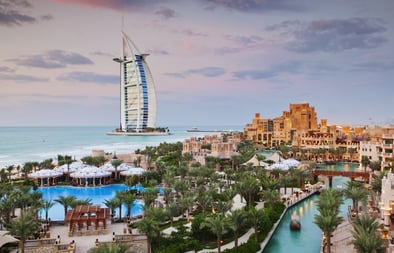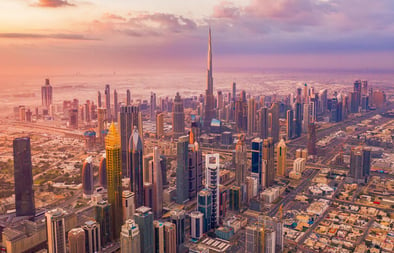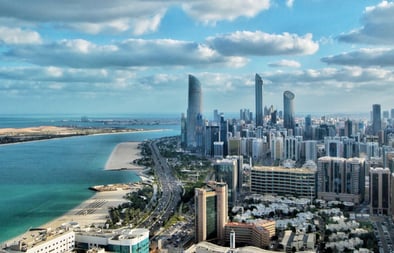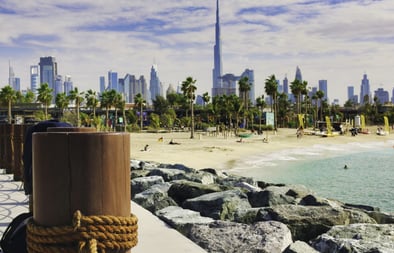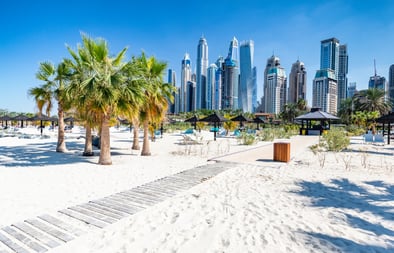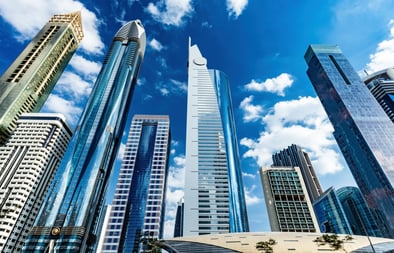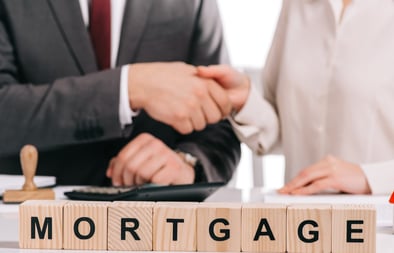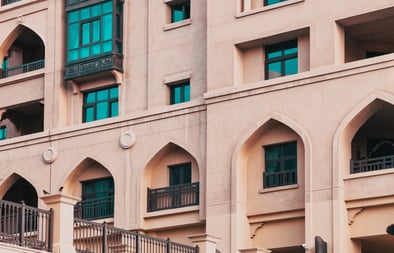Dubai, a vibrant cosmopolitan city known for its stunning skyscrapers, luxury shopping, and lively nightlife, has become a global magnet for international investors. The city's skyline, adorned with architectural marvels such as the Burj Khalifa and the Burj Al Arab, epitomizes the fusion of innovation and luxury. Dubai's strategic location at the crossroads of Europe, Asia, and Africa, coupled with its world-class infrastructure, has cemented its reputation as a premier business and leisure destination. The city boasts an array of high-end retail centers, gourmet dining establishments, and cultural attractions, making it an appealing place to live and invest.
One of the most compelling reasons for Dubai's appeal is its dynamic real estate market, which is considered one of the most lucrative in the world. The market's robust performance is driven by a variety of factors, including a strong economy, favorable government policies, and a growing expatriate population. The diversity of investment opportunities in Dubai's real estate sector is remarkable, ranging from luxury apartments and villas in prime locations to more affordable options in emerging areas. Investors can choose from completed properties ready for occupancy or off-plan projects offering potentially high returns on investment.
The continuous development of new projects and the expansion of existing communities ensure that the real estate market in Dubai remains vibrant and full of potential. Areas such as Downtown Dubai, with its iconic landmarks and bustling atmosphere, and Dubai Marina, known for its picturesque waterfront living, are among the most sought-after by both investors and residents. Meanwhile, new and emerging areas like Dubai South and Mohammed Bin Rashid City are gaining popularity due to their strategic locations and innovative developments.
Investing in Dubai's real estate market is not only about capital appreciation but also about generating rental income. The city attracts millions of tourists and expatriates each year, creating a steady demand for rental properties. This demand is particularly high in popular residential and commercial hubs, making property investment in these areas highly profitable. Additionally, the government's initiatives to attract foreign investment, such as offering long-term residency visas and improving transparency in property transactions, have further enhanced the market's attractiveness.
This detailed guide is designed to help you navigate the complexities of buying property in Dubai, ensuring you are well-informed and prepared at every step of the process. From conducting initial research and understanding market trends to navigating the legal framework and completing the purchase, this guide covers all the essential aspects of property investment in Dubai. Whether you are a first-time investor or an experienced one looking to diversify your portfolio, this comprehensive resource will provide you with the knowledge and tools needed to make informed decisions and capitalize on the opportunities available in Dubai's thriving real estate market.
1. Understanding the Market
a. Market Overview
Dubai's real estate market is known for its rapid growth and diversification, constantly evolving to meet the demands of a global investor base. This market is marked by a blend of well-established, highly sought-after neighborhoods and promising new developments. Among the key areas, Downtown Dubai stands out as a major investment hub. It is home to some of the city’s most iconic landmarks, including the Burj Khalifa and The Dubai Mall. The area offers a mix of luxury apartments and commercial spaces, attracting both high-end buyers and corporate tenants. Its central location and vibrant lifestyle make it a top choice for investors seeking high returns and steady rental income.
b. Market Trends
To make informed investment decisions, it is crucial to stay updated on market trends by regularly following real estate reports, market analysis, and news. These sources provide valuable insights into the current state of the market, helping investors understand which factors are influencing property prices and demand.
2. Legal Framework for Foreign Investors
a. Ownership Types
Foreign investors can buy property in designated freehold areas in Dubai. Freehold ownership allows investors to own the property outright, including the land it stands on, without any time restrictions.
b. Legal Requirements
• Age Requirement: Investors must be at least 21 years old.
• Valid Passport: A valid passport is required to initiate the process.
• No Residency Requirement: You do not need to be a resident of Dubai to purchase property.
3. Financial Preparation
a. Budgeting
Determining your budget is a critical step in the property buying process, and it involves more than just considering the purchase price of the property. A thorough financial assessment will help you understand the full scope of your investment and avoid unexpected expenses.
b. Financing Options
• Cash Purchase: Many international investors prefer to buy property outright.
• Mortgage: Various banks in Dubai offer mortgage options to non-residents. Ensure you have a good credit history and meet the eligibility criteria.
4. Choosing the Right Property
a. Property Type
Decide on the type of property you want to invest in:
• Apartments: Popular in areas like Dubai Marina and Downtown Dubai.
• Villas: Ideal for family living, available in areas like Arabian Ranches and Emirates Hills.
• Off-Plan Properties: New developments that are often available at lower prices and flexible payment plans.
b. Location
Choose a location based on your investment goals. For rental income, areas with high demand like Business Bay and Dubai Marina are ideal. For long-term growth, consider emerging areas with ongoing infrastructure projects.
5. Engaging a Real Estate Agent
a. Finding a Reputable Agent
When selecting a real estate agent to assist you in navigating the Dubai property market, it is crucial to collaborate with a professional who possesses both certification and extensive experience in the field. An adept agent with a deep understanding of the Dubai market dynamics can significantly enhance your property buying experience and help you make informed decisions.
b. Agent's Role
Engaging a real estate agent can be a pivotal step in your property buying journey, especially in a complex market like Dubai. A skilled agent offers a range of valuable services that can streamline the entire process and ensure a successful transaction.
6. Property Viewing and Selection
a. Virtual Tours
For international investors, virtual tours can be a convenient way to view properties initially.
b. In-Person Visits
Plan a visit to Dubai to view shortlisted properties in person. Assess the property's condition, location, and surrounding amenities.
7. Making an Offer
a. Negotiation
Work with your agent to negotiate the price. Consider the market conditions and the property’s valuation.
b. Offer Letter
Once a price is agreed upon, an offer letter is drafted and signed by both parties. This is a non-binding agreement that outlines the agreed price and terms.
8. Legal Due Diligence
a. Title Deed Verification
When ensuring that a property has a clear title deed with no outstanding disputes or debts, you're essentially verifying the property's legal ownership and financial status. This process is crucial in real estate transactions to avoid potential legal complications or financial liabilities down the line.
b. Developer and Property Verification
When considering off-plan properties, it's paramount to thoroughly vet the developer's credentials and confirm the project's approval status with the Dubai Land Department (DLD). This meticulous process is crucial for safeguarding your investment and ensuring that the property meets all regulatory standards and legal requirements.
9. Sales Agreement
a. Sales and Purchase Agreement (SPA)
Draft the SPA, outlining the terms and conditions of the sale. This is a legally binding document.
b. Signing and Down Payment
In the property transaction process, both the buyer and seller typically sign the Sales Purchase Agreement (SPA). As part of this agreement, the buyer is required to make a down payment, which is commonly set at around 10% of the property's purchase price. This down payment serves as an initial commitment from the buyer and is often made upon signing the SPA to secure the property and initiate the purchase process.
10. Transfer of Ownership
a. NOC from Developer
When purchasing a property, especially in Dubai's dynamic real estate market, it's essential to obtain a comprehensive No Objection Certificate (NOC) from the developer. This certificate serves as a crucial document that confirms several key aspects related to the property's ownership and operational status.
b. Registration with DLD
Registering the property with the Dubai Land Department (DLD) is a crucial step in the property ownership process, as it legally establishes the buyer's ownership rights and responsibilities. This process involves submitting the necessary documents and paying the required fees, typically amounting to 4% of the property's value, as determined by the DLD's valuation.
11. Finalizing the Purchase
a. Payment of Remaining Amount
Paying the remaining balance of the property price as per the Sales Purchase Agreement (SPA) terms is the final step in completing the property purchase transaction. The SPA is a legally binding contract that outlines the terms and conditions agreed upon by the buyer and seller regarding the sale of the property.
b. Handover
Receiving the keys and taking possession of the property is an exciting and significant milestone in the property ownership journey. It marks the completion of the purchase process and signifies that you are now the legal owner of the property. However, before fully settling into your new property, it's essential to conduct a final inspection to ensure that everything is in order and meets your expectations.
12. Post-Purchase Considerations
a. Property Management
Engaging a property management company can provide a range of advantages, particularly for rental property owners or those seeking professional management of their property investments. These benefits may include streamlined property operations, efficient tenant management, expert knowledge of local market trends, timely maintenance and repairs, effective marketing strategies to attract tenants, and overall peace of mind knowing that your property is in capable hands.
b. Rental Income
For investors focused on generating rental income, it's essential to market the property effectively to attract tenants. Consider leveraging strategies such as short-term rentals, particularly in tourist-heavy areas, to maximize returns. By tailoring your marketing efforts to target potential tenants and highlighting the property's unique features and amenities, you can create a compelling value proposition that attracts renters and optimizes rental income potential.
c. Resale Strategy
Developing a long-term resale strategy for your property requires thoughtful consideration and ongoing monitoring of various factors that can influence market conditions and property values. This strategy is essential for property owners who aim to optimize their investment returns over an extended period.
13. Navigating Taxes and Fees
a. Registration Fees
Typically 4% of the property value, paid to the DLD during the registration process.
b. Agent Fees
Real estate agents usually charge 2% of the property price as a commission.
c. Service Charges
The annual charges for property maintenance, security, and communal amenities are essential aspects of owning a property and contribute to its overall upkeep and functionality. These charges encompass various services and expenses that ensure the smooth operation and maintenance of residential or commercial properties.
14. Staying Informed and Updated
a. Market Research
Remaining current with market trends, government policies, and economic factors impacting the Dubai real estate market is crucial for property investors and industry professionals alike. This continuous update ensures informed decision-making, proactive adaptation to regulatory changes, and a deeper understanding of market dynamics. By staying abreast of these key elements, investors can navigate market shifts effectively, capitalize on opportunities, and mitigate risks, leading to more successful and sustainable real estate investments.
b. Networking
Engaging actively in real estate investment groups, attending property exhibitions, and networking with fellow investors are fundamental strategies to remain well-informed, acquire valuable insights, and broaden your professional network within the real estate sector. These activities offer a platform for exchanging knowledge, discussing industry trends, exploring investment opportunities, and establishing meaningful connections with like-minded professionals and experts. By embracing these strategies, you can enhance your understanding of the market, stay updated on emerging trends, and foster collaborative opportunities that contribute to your success as a real estate investor.
Conclusion
Investing in Dubai's real estate market as an international investor holds great potential for success given the proper knowledge and preparation. This guide offers a thorough roadmap, covering everything from market insights and legalities to the final purchase and property management. By adhering to these steps and leveraging expert guidance as needed, you can confidently navigate Dubai's real estate landscape, ensuring informed investment choices and a prosperous venture.
























